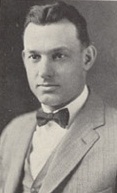
Phi Delta Chi (ΦΔΧ) was founded on 2 November 1883 at the University of Michigan in Ann Arbor by 11 men, led by Dean Albert B. Prescott. The fraternity was formed to advance the science of pharmacy and its allied interests, and to foster and promote a fraternal spirit among its brothers, now both male and female.

Sigma Alpha Iota (ΣΑΙ) is an International Music Fraternity. Formed to "uphold the highest standards of music" and "to further the development of music in America and throughout the world", it continues to provide musical and educational resources to its members and the general public. Sigma Alpha Iota operates its own national philanthropy, Sigma Alpha Iota Philanthropies, Inc. Sigma Alpha Iota is a member of the National Interfraternity Music Council and the Professional Fraternity Association.

Sigma Theta Epsilon (ΣΘΕ) is an interdenominational national Christian fraternal organization, currently with three active chapters. Originally called Delta Sigma Theta, Sigma Theta Epsilon Christian Fraternity traces its history to Phi Tau Theta's founding in 1925 at Lincoln, Nebraska and Sigma Epsilon Theta's founding in 1936 at Indiana University.

Phi Chi Theta is one of the largest co-ed professional business fraternities in the United States. Phi Chi Theta was founded as a women's business fraternity on June 16, 1924 in Chicago, Illinois. Today, Phi Chi Theta comprises 41 collegiate and alumni chapters across the United States. While most chapters are now co-ed, there are some which have only women as members.

Elmer Ernest Bearg was an American football and basketball coach. He served as the head football coach at Washburn University from 1918 to 1919 and again from 1929 to 1935 and the University of Nebraska–Lincoln from 1925 to 1928, compiling a career college football record of 69–40–7. Bearg also spent one year as Nebraska's men's basketball coach (1925–1926) and posted an 8–10 mark. Before coming to Nebraska, he also served as an assistant coach at the University of Illinois at Urbana–Champaign under Robert Zuppke
Ozell Miller Trask was a United States Circuit Judge of the United States Court of Appeals for the Ninth Circuit.
Delta Theta Phi (ΔΘΦ) is a professional law fraternity and a member of the Professional Fraternity Association. Delta Theta Phi is the only one of the two major law fraternities to charter chapters (senates) in the United States at non-American Bar Association-approved law schools. Delta Theta Phi can trace its roots to Delta Phi Delta on September 15, 1900 at the then-named Cleveland Law School, now Cleveland-Marshall College of Law in Ohio. Delta Theta Phi has initiated more than 138,000 members across the country and in several other nations.
Brigadier General Howard Sanford Searle was responsible for rebuilding the Kansas Army National Guard after World War II and leading the response to two major natural disasters, the Great Flood in Kansas City in 1951 and the tornado that destroyed much of Udall, Kansas in 1955.
Warren W. Shaw was a judge, a member of U.S. General Dwight D. Eisenhower's staff during World War II, a representative in the Kansas House of Representatives and the 1956 Republican nominee for Kansas governor.
Robert Stone was the Speaker of the Kansas House of Representatives and a prominent attorney and civic leader in Kansas.
Harold Shields Herd was a Kansas Supreme Court justice (1979–1993), minority leader in the Kansas State Senate (1969–1973), mayor of Coldwater, Kansas (1950–1954) and an officer in the U.S. Navy during World War II.
Tyler C. Lockett is an attorney, judge and former Kansas Supreme Court justice (1983–2002).
Ronald K. Richey was the chairman, president and chief executive officer of Torchmark Corporation.
Henry Freeman Mason was a Republican politician and justice of the Kansas Supreme Court from January 12, 1903 to May 4, 1927.
Arthur J. Carruth Jr. was a leading newspaperman and civic leader in Kansas for more than five decades.

The Association for Women in Communications (AWC) is an American professional organization for women in the communications industry.
Delta Psi Kappa (ΔΨΚ) is a national honors fraternity in the disciplines of health and physical education, health sciences, and recreation.














